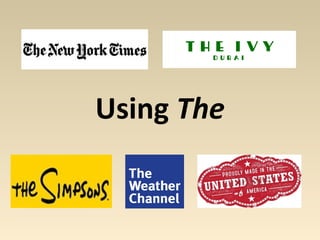Using The
- 1. Using The
- 2. THE âĒ When there is only one of something ï What is the longest river in the world? ï The earth goes round the sun and the moon goes round the earth. ï Have you ever crossed the equator? ï Iâm going away at the end of this month. ï Paris is the capital of France. âĒ Compare the and a/an: ï The sun is a star. ï The hotel we stayed at was a very nice hotel. *Thus, we use a/an to say what kind of thing something is.
- 3. THE âĒ The sky âĒ The sea âĒ The ground âĒ The country (= not in a town) âĒ The environment ï We looked up at all the stars in the sky. ï Would you like to live in the country? ï We must do more to protect the environment. âĒ Compare the following uses of space: ï There are millions of stars in space. ï I tried to park my car, but the space was too small. *Thus, we say space (without the) when we mean âspace in the universeâ.
- 4. THE âĒ The same ï Your jacket is the same as mine. ï Are these envelopes the same? âĒ The cinema, the theater ï I go to the cinema a lot, but I havenât been to the theater for ages. *When we say the cinema/the theater, we do not necessarily mean a specific cinema/theater.
- 5. THE âĒ The radio, the Internet ï We heard the news on the radio. ï Do you believe everything you read on the Internet? âĒ Compare the following uses of television: ï I watch television a lot. ï Can you turn off the television, please?? *Thus, we say the television when we mean âtelevision setâ.
- 6. THE âĒ Compare these sentences with the ones in the previous slide: ï School begins at 9 A.M. and ends at 3 P.M. ï Kenâs brother is in prison for robbery. ï Joe had an accident last week. Heâs in hospital now. ï What course are you taking at university? ï Sallyâs father is a devout Catholic. He goes to church every day. *Thus, we DONâT use the when we are thinking of the general idea of places and what they are used for.
- 7. THE Specific People or Things ï We took the children to the zoo. ï The film wasnât very good, but I liked the music. ï All the cars in the car park belong to people who work here. ï Can you pass the sugar, please? (= sugar on the table) ï The English people I know drink a lot of tea. General People or Things ï Children learn from playing. ï I enjoy listening to music. ï All cars have wheels. ï Sugar is bad for your health. ï English people drink a lot of tea. âĒFor specific people or things
- 8. THE âĒ For a specific type of animal ï The giraffe is the tallest of all animals. ï The monkey-eating eagle can be found in the Philippines. *Compare the and a/an: ï The giraffe is my favorite animal. ï We saw a giraffe at the zoo.
- 9. THE âĒ For a specific type of musical instrument ï Can you play the guitar? ï Sherry learned to play the piano at 11. *Compare the and a/an: ï I can play the piano well. ï Iâd like to have a piano.
- 10. THE âĒ The + adjective for groups of people *The rich = rich people, the homeless = homeless people ï Do you think the rich should pay higher taxes? ï The government has promised to provide more money to help the homeless.
- 11. THE âĒ For nationality adjectives ending in: *-ch or âsh ïThe French are famous for their food. ïThe English like to drink tea. ïThe Spanish love bullfighting. *-ese ïThe Chinese invented printing. ïThe Japanese have long life spans.
- 12. THE âĒ For names of places with Republic, Kingdom, and States ïthe Czech Republic ïthe United Kingdom (the UK) ïthe United States of America (the USA) âĒ For plural names of people and places
- 13. THE âĒ For the names of oceans, seas, rivers, and canals ï the Atlantic (Ocean) ï the Indian Ocean ï the Mediterranean (Ocean) ï the Red Sea ï the Amazon ï the Nile ï the Suez Canal âĒ For the names of deserts ï the Sahara (Desert) ï the Gobi Desert
- 14. THE With the ï the north of Brazil ï the southeast of Italy ï the Middle East, the Far East Without the ï northern Brazil ï southeastern Italy ï North America, South Africa, etc. âĒFor compass points/regions Compare the following:
- 15. THE âĒ For most buildings *We often leave out the noun: ï the Sheraton (Hotel) ï the Place (Theatre) ï the Guggenheim (Museum) *Some names are only the + noun: ï the Acropolis ï the Kremlin ï the Pentagon
- 16. THE âĒ For names with of ï the Bank of England ï the Great Wall of China ï the Museum of Modern Art ï the Tower of London *Compare the following: ï the University of Cambridge ï Cambridge University *If the first word is the name of a place (e.g., Manchester) or a person (e.g., Harvard), we DONâT usually use the. ï Victoria Station ï Buckingham Palace ï Canterbury Cathedral ï Edinburgh Castle ï Sydney Harbour
- 17. THE âĒ For most newspapers and many organizations ï Newspapers: the Washington Post, the Financial Times, the Sun ï Organizations: the European Union, the BBC (= British Broadcasting Corporation, the Red Cross) *But names of companies, airlines, etc. are usually WITHOUT the. ï Kodak ï Sony ï IBM ï British Airways ï Yale University Press
















